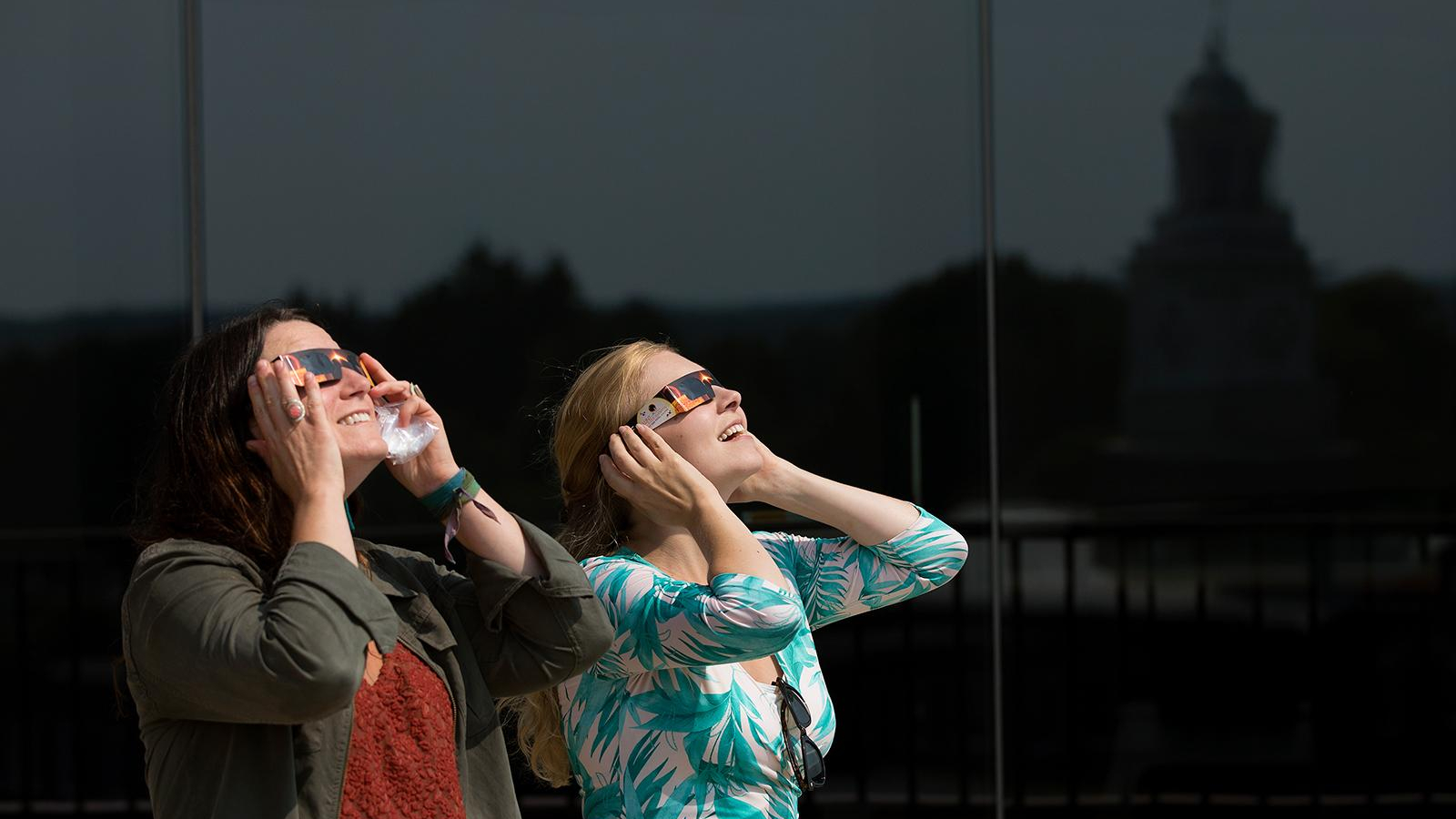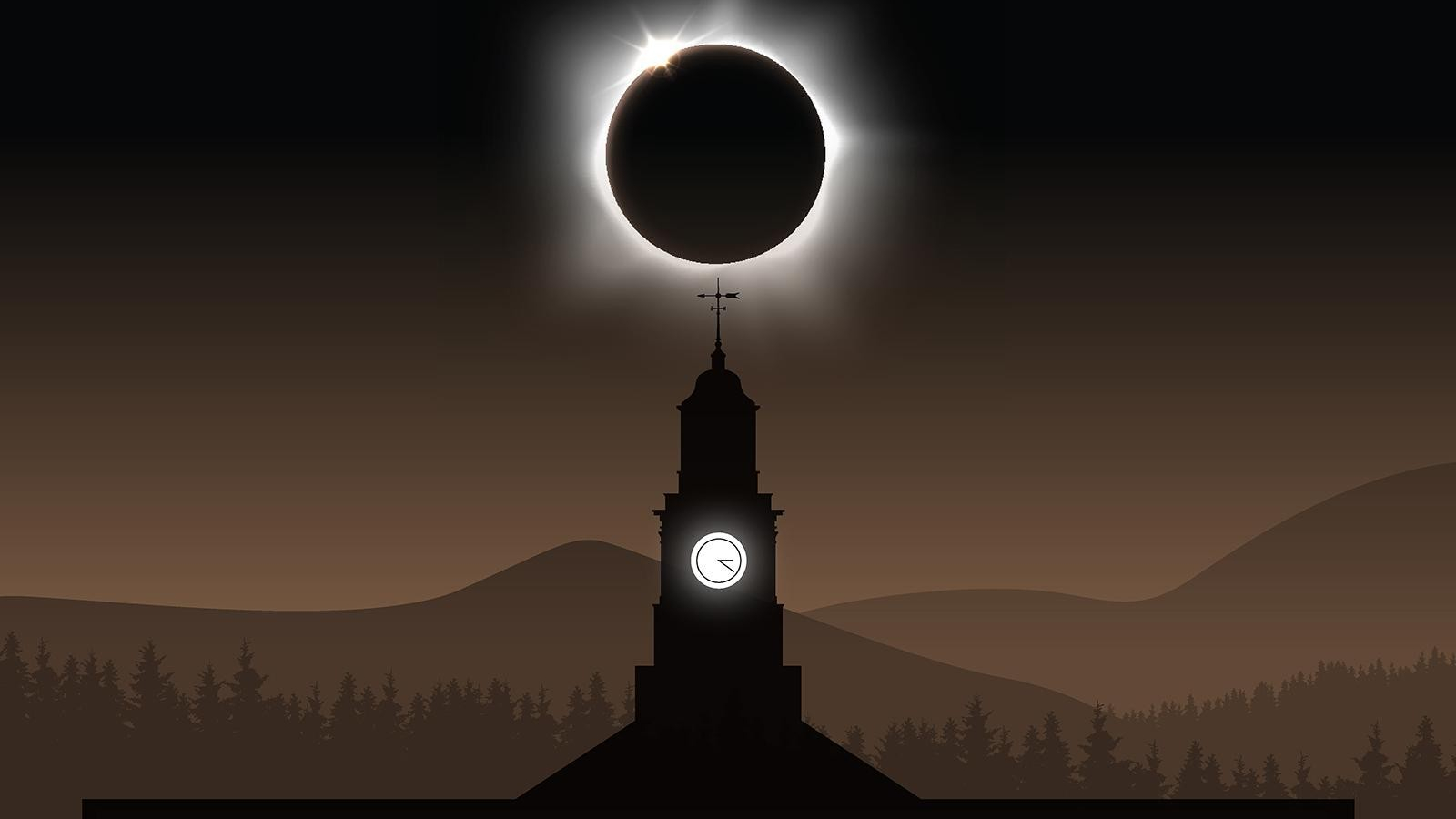I'm driving 6 hours through New York's Adirondacks to see the 2024 total solar eclipse from Potsdam. Here's why.
The first total solar eclipse I saw in 2017 was a work event. For the 2024 total solar eclipse, I'm bringing my kid.
Seven years ago, I witnessed my first total solar eclipse. Yes, it was amazing and spectacular, but it was also, surprisingly, a bit sad. Let me explain.
I witnessed my first total solar eclipse on Aug. 21, 2017 from Saluki Stadium at Southern Illinois University in Carbondale (which, coincidentally, will see another total eclipse of the sun on April 8). And while there were thousands of other spectators there, it was by all accounts a work event. My friends and family were at home in New Jersey, out of the totality zone and hoping to glimpse maybe a meager partial eclipse of the sun. So, as totality finished and the sun peeked out from behind the moon, the exhilaration from witnessing a cosmic event was replaced by a twinge of regret for leaving my family behind.
But, weather permitting, that will change for the 2024 total solar eclipse on April 8. This time I'm bringing my 15-year-old daughter Zadie and some friends.
Total solar eclipse 2024: Live updates
Related: 10 things you probably didn't know about the 2024 total solar eclipse
For the April 8 solar eclipse, I'm headed from New Jersey through the Adirondack mountains of upstate New York — which I'm told are stunning — to visit Potsdam, a college town of about 15,000 people that's also home to the State University of New York Potsdam and Clarkson University. I picked the location at the suggestion of close friends with ties to the school, who noticed not only that it was opening its dorms to eclipse chasers (at a bargain $60 per night compared to $370-a-night hotel I had on hold at Saranac Lake), but that the university town had set up a range of community events to celebrate the eclipse. It sounded perfect to share a cosmic event with family.
"What are you looking forward to most for the solar eclipse?" I asked my daughter after the first leg of our 6-hour drive. (My wife volunteered to stay behind to watch over our cat Morris. They both have eclipse glasses and will see a 91.5% eclipsed sun, weather permitting.)
"To just see the solar eclipse, dad," she said.
Breaking space news, the latest updates on rocket launches, skywatching events and more!
Teenagers.
Sorry, Space Fans. They're all out of free solar eclipse glasses at the Platekill Rest Stop off I-87 in New York. Try again tomorrow. They have 100 per day from NY State gov. #SolarEclipse2024 #SolarEclipse #Eclipse2024 Totality or bust!🌞🌑🌞 pic.twitter.com/dfqb326uKvApril 6, 2024
Still, if all goes well — and the skies are clear — Potsdam will see up to 3 minutes and 14 seconds of totality between 3:24 p.m. and end at 3:27 p.m. EDT on April 8 for the 2024 total solar eclipse. It's a sight the village won't see again until 2399, local officials have said.
"The Village of Potsdam, along with the rest of the North Country, is over the moon — pardon the pun — to be in the path of the 2024 total solar eclipse," Potsdam Mayor Alexandra Jacobs Wilke told me in an email. "This is a truly generational event that won't ever happen again here, in our lifetimes or our children's lifetimes. We feel fortunate to be in this particular place at this exact moment in time, and look forward to sharing that sense of wonder with all our visitors as well."
While other nearby universities are holding campus-only events, SUNY Potsdam is opening its doors to the public and hoping to host up to 5,000 visitors for the eclipse on Monday afternoon (that's how many eclipse glasses the school ordered for the event) with a series of educational activities and talks for students and the public from 1:30 p.m. to 4 p.m. EDT.
Related: Top 5 items we recommend to safely observe the sun
"We expect our students, we expect our staff, we expect our faculty and we expect some of the community to come to campus to participate in the event," Dr. Page Quinton, a geochemist and associate professor Earth and Environmental Sciences who is helping organize the event. "But we've been warned that we could have thousands of people coming to the area from outside."
SUNY Potsdam students were scheduled to return to classes on April 8 after a week off for spring break, but the university canceled classes — as did the town's school district — so students could have a chance to see the solar eclipse. Potsdam Central School District also sent its elementary students home with free eclipse glasses before the class break, Wilke said.
Quinton said the university has lined up eclipse-themed Frisbees, stickers and other keepsakes for visitors (as well as Potsdam eclipse-themed merch available for sale), but the event is also a chance for the school itself to shine.
"This eclipse is bringing us the opportunity for everyone to interact with parts of campus that they may not always interact with, or for the community to interact with us in ways that they don't always get to," she said.
One unexpected bonus from picking SUNY Potsdam for the eclipse: My daughter will get her first taste of what college life might be like as we stay in the university's dorms. The school is also holding a welcome event for prospective students to showcase what SUNY Potsdam has to offer.
For her part, Quinton is hoping to see her first totality after seeing a partial eclipse.
"I've actually never seen that total solar eclipse, so I'm quite excited to see one," she added.
Elsewhere in Potsdam, visitors can take a three-day Eclipse Fragrance Festival at the Adirondack Fragrance Farm while other celebrations go on across the wider St. Lawrence County that the village calls home. Jernabi Coffeehouse in Potsdam has cooked up some eclipse-themed brews for coffee fans to enjoy (which I plan to try for sure) and the local children's museum has been holding Science Saturday events for kids to learn about eclipses.
"St. Lawrence County has been preparing for the eclipse for quite a while now, and yet, it is still difficult to know what to expect!" Wilke told me. "As of today, the conditions in our area look like they will be clear, so we may see a last-minute rush of visitors to our area who had originally planned on viewing the eclipse elsewhere. Since we are not bisected by major highways, we aren't anticipating the high level of traffic that the Buffalo, N.Y., area is, or the Watertown, N.Y., area just to our south."
Wilke said her young daughter's Girl Scout troop built their own pinhole camera solar viewers out of boxes last fall for the Oct. 14 annular solar eclipse in order to land their eclipse merit badges and are gearing up for the total eclipse on April 8. (Our guide on how to make a pinhole camera can help you make one of your own, our you can just check out our guide for the best solar viewing gear.)
"This is an opportunity to come together and experience the awe of the cosmos in a communal environment unlike any other," Wilke said. "I hope this gives us a chance to show the best of what Potsdam has to offer, for both our residents and visitors."
"It's a reminder that in the scope of our vast universe, we are an infinitesimal speck ... but a beautiful speck indeed, one worth protecting for the future."
Submit your story and photos! If you capture a photo of the April 8 total solar eclipse and would like to share it with Space.com's readers, send photos, videos, comments about your trip, and your name, location and content usage permission release to spacephotos@space.com.

Tariq is the award-winning Editor-in-Chief of Space.com and joined the team in 2001. He covers human spaceflight, as well as skywatching and entertainment. He became Space.com's Editor-in-Chief in 2019. Before joining Space.com, Tariq was a staff reporter for The Los Angeles Times covering education and city beats in La Habra, Fullerton and Huntington Beach. He's a recipient of the 2022 Harry Kolcum Award for excellence in space reporting and the 2025 Space Pioneer Award from the National Space Society. He is an Eagle Scout and Space Camp alum with journalism degrees from the USC and NYU. You can find Tariq at Space.com and as the co-host to the This Week In Space podcast on the TWiT network. To see his latest project, you can follow Tariq on Twitter @tariqjmalik.


